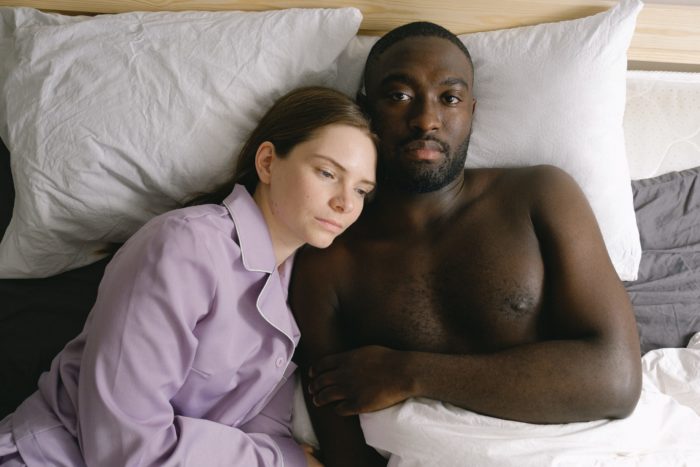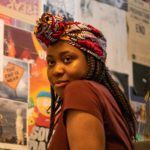
The exclusion of BIPOC persons causes harm. I know I’m not alone in thinking this.
“Sorry I am talking about race too much,” I said sheepishly.
My date nodded politely and said, “Of course. It’s OK.”
His response, specifically his demeanor, struck me as a bit ingenuine and added to the long list of strikes I had already been mentally tallying all night on our walking date. I jokingly refer to it as my “Are You Woke Enough?” checklist, a series of questions or phrases I drop throughout meetups to cause the usual discomfort on the topic of race.
After the Black Lives Matter movement of 2020 and the minimal advancement for the betterment of Black lives, I am at the point where I do not even try to make my remarks accommodating. My life as a twentysomething Black woman in the city revolves around the system of anti-Blackness coupled with misogyny, so racial discomfort in conversations is truthfully the least of my worries.
“Thank God I did not agree to meet at my place,” I thought to myself as we approached the end of our walk. I quickly rushed through goodbye pleasantries, half-listening to his suggestion to meet up again.
With the appointments of Kim Janey as Boston’s first Black and female mayor and Rachael Rollins as district attorney and Ayanna Pressley in Congress, Boston seems to be becoming the place for emerging Black millennials, specifically Black women. While the cost of rent can be hair-raising, the city’s concentration of universities and colleges, uptick of startups, and solid public transit offer immense perks. These attributes were what drew me to the city three years ago to complete my masters.
But although these prominent appointments represent great strides in the public sector, the effects are hardly felt by most Black, Indigenous, and People of Color (BIPOC) in the city. The history of redlining in Boston has permanently enforced segregation along racial lines, with further impacts manifesting on a social level too. As Zebulon Miletsky and Tomas Gonzalez wrote in a 2018 piece for Black Perspectives, this segregation has had long-lasting implications for “Boston’s public housing and public education, in addition to virtually every other aspect of daily life.” Currently, according to data from the city’s Planning and Development Agency, neighborhoods such as Beacon Hill, Charlestown and Back Bay are more than 70% white.
Looking at the ways we establish interpersonal relationships, our professional and personal spaces are key starting points. Unfortunately, Boston’s pedagogy from the getgo sets the tone for how we interact. Because under the masquerade of a liberal and progressive city, white fragility and solidarity flourishes, potentially making for traumatic experiences for BIPOC residents—including on the city’s dating scene.
As a Black woman with an education and income level that’s higher than average for my race and demographic, I find most of my academic and professional spaces to be predominately white. Due to the plight of race in America, white men are not exactly my desired pickings, especially after dating one. I am not particularly trying to date Jake or Tanner down the hall who always seems to be perplexed when I change my hairstyle, nor am I interested in a seemingly nice-meaning white associate whose indirect discrimination is more harmful than they think.
Dating apps do not help either. Probably the most glaring evidence of white supremacy in the city’s dating scene is the fetishization and exclusion of BIPOC persons in online dating. In a recent study titled The Uncanny Swipe Drive: The Return of a Racist Mode of Algorithmic Thought on Dating Apps, researcher Gregory Narr notes how algorithmic media such as dating apps “allow unconscious racial preferences to be expressed without troubling users’ perceptions of themselves as non-racist. These preferences … treat ‘attractiveness’ as a zero-sum game … and ultimately amplify the salience of race as a factor of success for finding intimacy.” Add in the context of all things Boston, and you may begin to see my point.
I am certainly not alone with this experience. While working at a nonprofit when I first moved to Boston, an Asian American co-worker first introduced me to the term “yellow fever.” Which is the strong sexual preference by white males for persons of Asian descent. That, along with other racial fetishizations such as the Black women jezebel stereotype, are commonly perpetrated by white Bostonians on dating apps. I have lost count of how many times someone has asked me about my butt size or made some weird comment about never having sex with a Black girl before.
On the opposite end of the spectrum, the exclusion of BIPOC persons in the city’s dating scene causes the same harm. The lack of BIPOC matchmakers, dating coaches, or events specifically catering to our demographic in the city is conspicuous. While different in objective when compared, the two practices are not mutually exclusive. For example, when speaking about this topic to a friend (who wanted to be identified as an upper-caste Indian graduate student), he noted how he received much fewer matches from white women compared to his time in Madison, Wisconsin. He theorized that due to Madison’s far less diverse population in comparison to Boston, his race and ethnicity made him much more exotic and a rarity there. With Boston’s moderate Asian population (third most common ethnic group), the uniqueness of being an Indian international student is not as strong. Coupled with the racial stereotypes associated with Asian men by white supremacy, specifically their emasculation, did not help to better his chances either.
My friend’s experience is similar to mine and common for many BIPOC Bostonians maneuvering through the dating pool, both online and in person. It’s a constant vicious cycle of being wanted only for our racial features and excluded when those features are no longer in or desirable.
At this point, what does it take to get an unproblematic fuck?
Pronounced say + you. I’m a Boston based artist, with my work focused in writing and explanatory journalism through multimedia.

